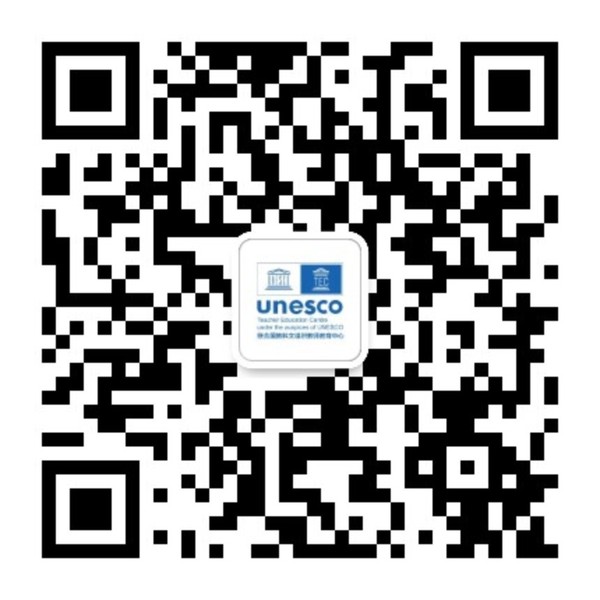On the morning of April 18, 2025, the closing ceremony for the 3rd Hong Kong STEAM Education Leadership Workshop was held at the UNESCO Teacher Education Centre (TEC). Attendees included Mr. Cheng Chung-kei (Senior Curriculum Development Officer, Science), Mr. Cheung Tsz-wai (Senior Curriculum Development Officer, Primary School-Based Curriculum Development), Mr. Chan Ka-lok (Curriculum Development Officer, Mathematics) from the Hong Kong Education Bureau, TEC Director Prof. Zhang Minxuan, Associate Director Prof. Hu Guoyong, and 32 Hong Kong school principals and teachers. Prof. Hu presided over the ceremony.
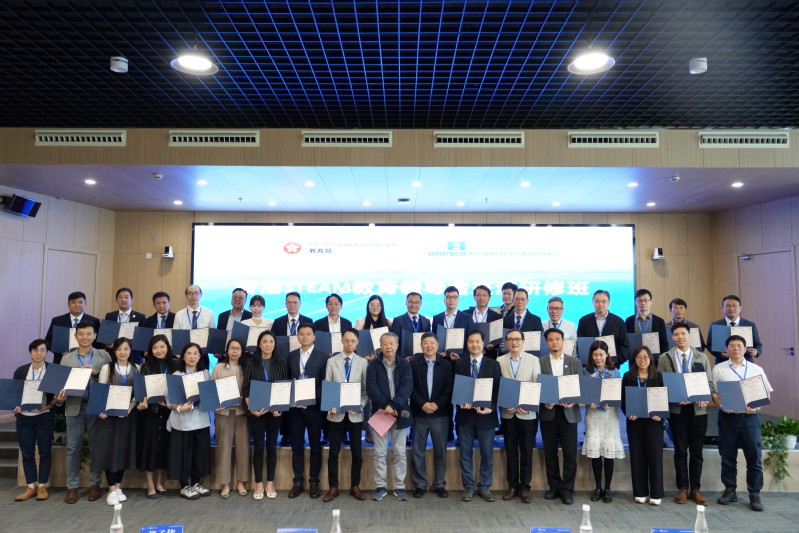
At the closing ceremony, attendees first watched a program recap video, revisiting highlights from the exchange program. Mr. Cheng Chung-Kei then delivered a speech, reflecting on the week-long learning journey and extending heartfelt gratitude to the participating principals and teachers. He emphasised that the knowledge and experiences gained through the program serve not only as nourishment for personal growth but also as critical foundations for advancing educational innovation.
Mr. Cheng specially acknowledged UNESCO TEC’s meticulous planning and the staff’s dedication, urging participants to prioritise action in driving educational reforms. Looking ahead, he expressed hope that members would continue exploring localised approaches to STEAM education, fostering students’ holistic development and cultivating future innovators for Hong Kong and the nation.
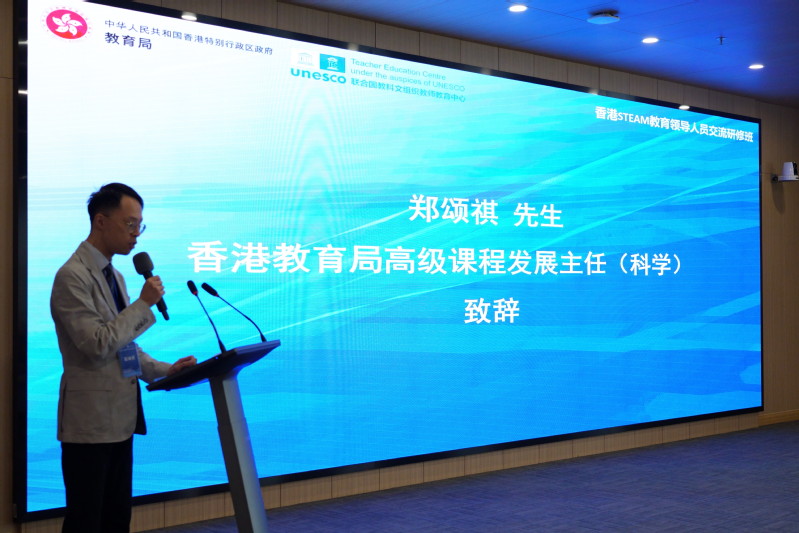
After the speeches, attendees received their certificates on stage, followed by a group photo, marking a symbolic conclusion to the successful workshop.
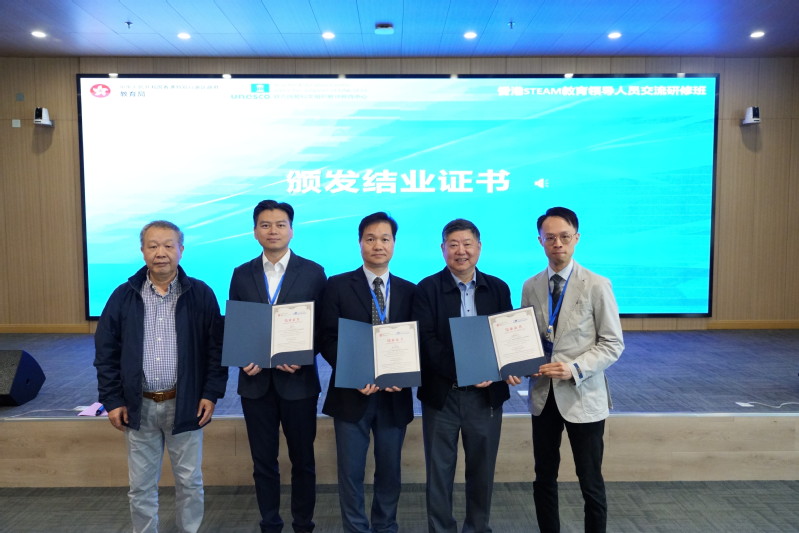
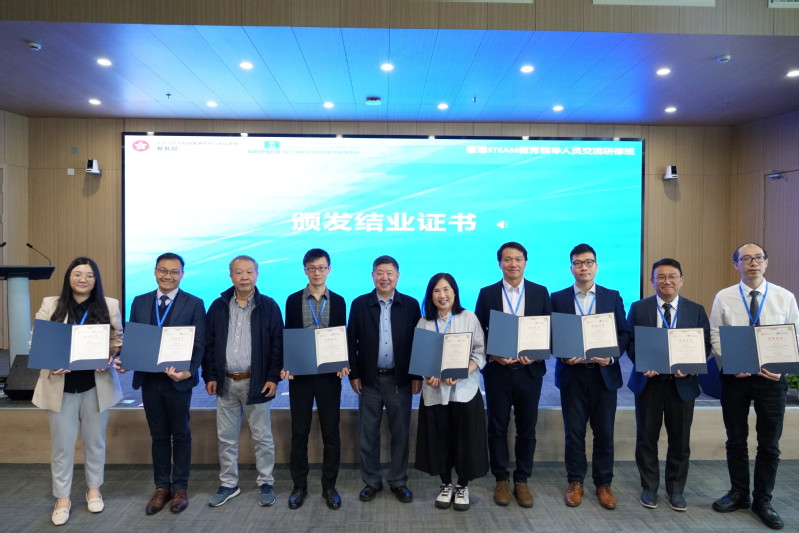
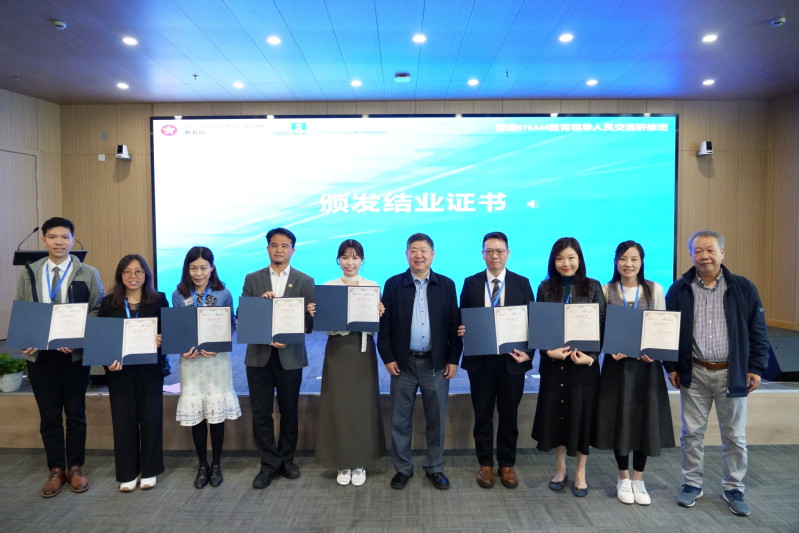
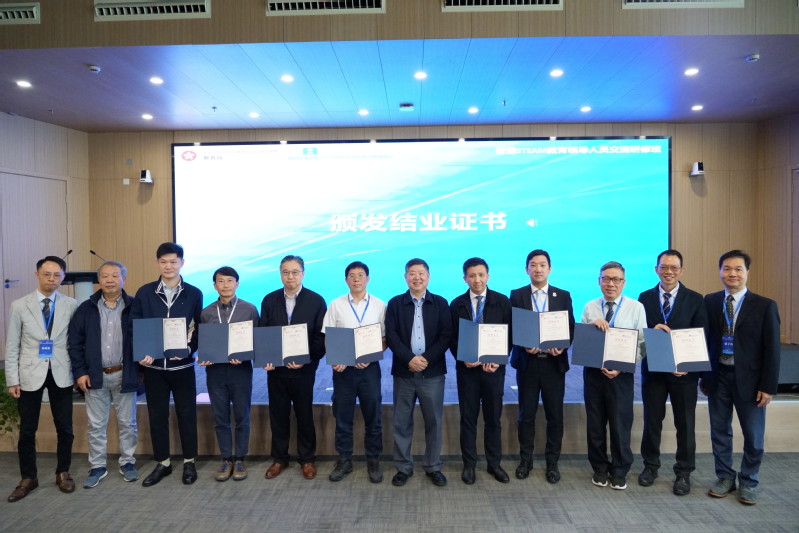
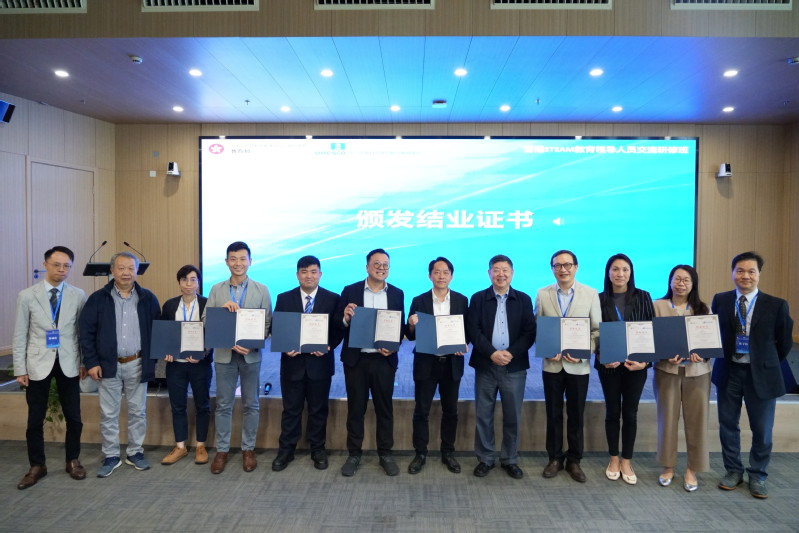
That morning, Professor Zhang Minxuan, Director of UNESCO TEC, delivered a lecture titled Shanghai’s STEAM Education Through the Lens of PISA. He reviewed Shanghai’s participation in PISA assessments and, by combining the city’s top-tier performance in mathematics and science, delved into the core values and practical pathways of STEAM education. Director Zhang proposed measures such as introducing interdisciplinary curricula, enhancing laboratories with new technologies, and promoting teacher professional development to position cities and institutions as robust pillars of STEAM education. Enhanced Field Visits Showcase Diverse STEAM Practices.
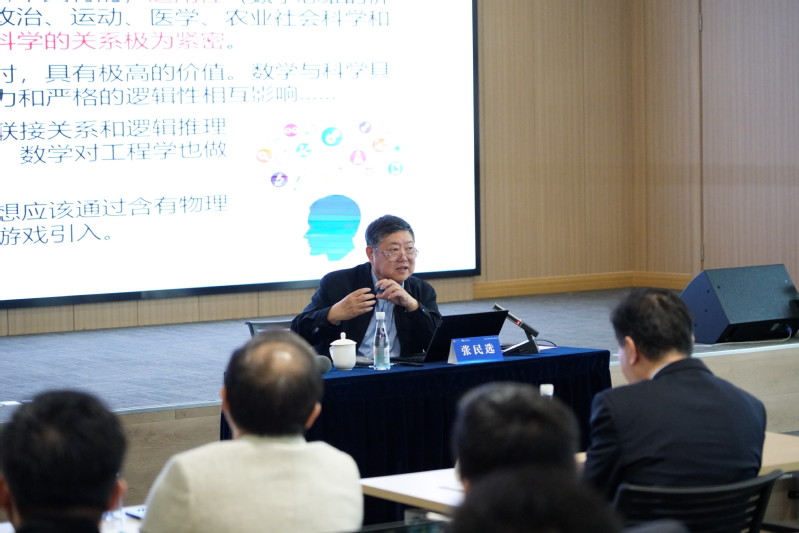
Building on previous workshops, this year’s program included visits to five new institutions. At the Shanghai Research Center for Digital Experiment Systems in Primary and Secondary Schools, participants received presentations from Dr. Li Ding, Deputy Director of the Center, and other faculty members, gaining insights into the development of digital experiment-based teaching in Shanghai’s schools and its achievements across disciplines such as physics, chemistry, biology, and geography. Educators from both Shanghai and Hong Kong conducted discussions on how digital experiment equipment can visualise hard-to-observe or abstract data and strategies to spark students’ scientific curiosity and exploration.
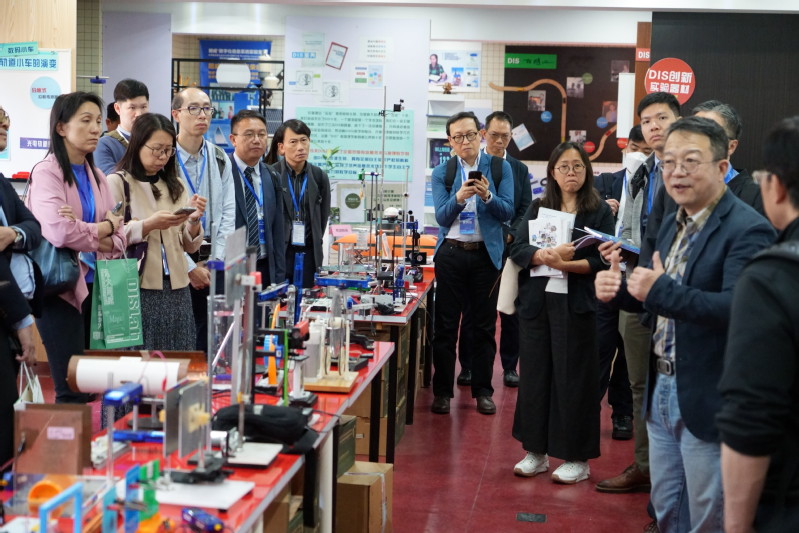
At Fenghua Middle School, program participants attended a presentation by Principal Zhu Yu on the school’s science education initiatives. Guided by the philosophy of “integrating scientific reasoning and nurturing through rationality,” the school has established a Science and Technology Innovation Centre, incorporating STEM education into its regular curriculum. This includes developing a school-based technology curriculum and hosting regular innovation and technology events.
Following the presentation, participants were divided into five groups to observe STEAM classes on topics such as drone technology and 3d printing. Each lesson incorporated interdisciplinary elements and provided students with hands-on experimentation time.
After the classroom observations, Ms. Luo Xin, Director of the School Administration Office, facilitated a discussion between Shanghai and Hong Kong educators on STEAM curriculum design, implementation, and assessment.

At Shanghai Changning Experimental Primary School, Vice Principal He Xing and faculty from the science department introduced the school’s distinctive HAO Community Curriculum Series, project-based STEM activities, disciplinary practice projects, and campus science festivals. Two student groups then showcased their innovation projects.
Following this, teachers Xue Wenfei and Yang Xin conducted a demonstration class on the interdisciplinary thematic learning unit “Sponge City System: Rainwater Infiltration and Collection Module.” Students engaged enthusiastically in hands-on exploration during the lesson. The teachers’ passionate explanations and impressive demonstrations drew frequent applause from program participants.
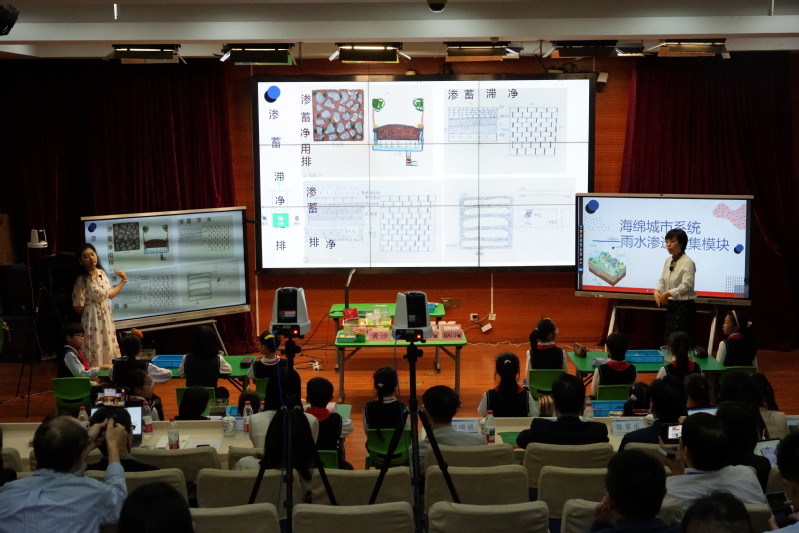
To explore extracurricular STEAM activities for Shanghai’s primary and secondary students, program members also visited the Pudong New Area Youth Activity Centre. Guided by Director Zhu Guohua and Deputy Director Wang Qinhua, they toured the Large Aircraft Innovation Experience Hall and the Insect Exploration Pavilion.
During the seminar session, Ms. Lyu Cuihong, Head of Foreign Affairs, Hong Kong, Macao, and Taiwan for the Pudong New Area Education Bureau and Director of the Pudong New Area Education International Exchange Center; Mr. Li Huanyu, Party Committee Secretary and Executive Vice Principal of Huadong Normal University No. 2 High School (Qiantan Campus); and Mr. Yang Zheng, Vice Principal of Zhuyuan Primary School, shared insights into STEAM education programs for youth both inside and outside classrooms across Pudong schools. Educators from Shanghai and Hong Kong discussed strategies to cultivate students’ creativity and confidence and explored approaches to optimise STEAM curriculum scheduling.
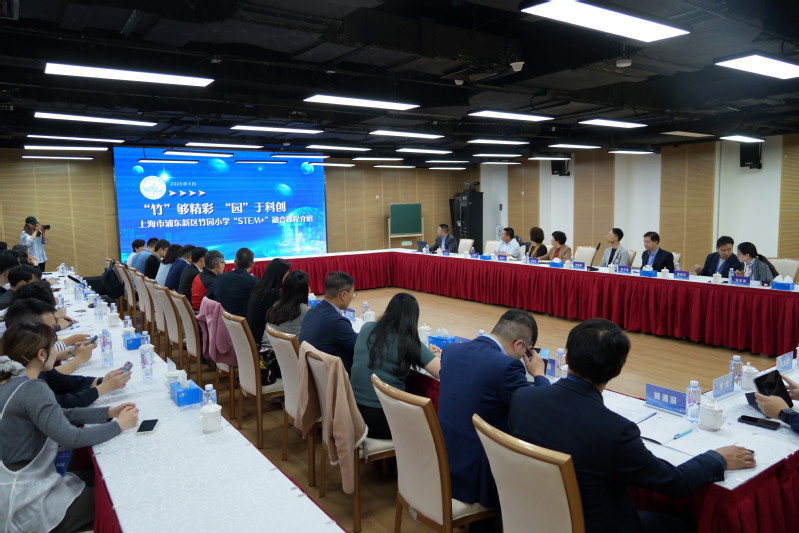
In the implementation of STEAM programs, urban science popularisation venues also play a crucial role. At the Pudong Urban Planning and Public Art Centre, participants of the training workshop experienced how interdisciplinary integration—spanning architecture, art, and digital technology—comes to life in science venues. They gained insight into the profound significance of using science and art to narrate the story of a city’s developmental journey, exploring how technological and artistic expressions can capture the essence of urban evolution.
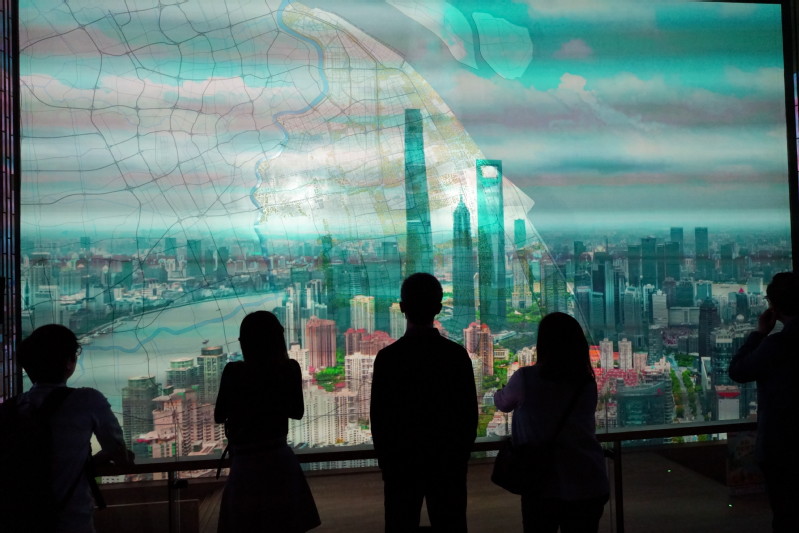
The successful convening of this training workshop further promoted the exchange and integration of knowledge between Shanghai and Hong Kong. Both sides will jointly unveil a new chapter in the development of STEAM education.
Contributed/Photos by: UNESCO Teacher Education Centre




